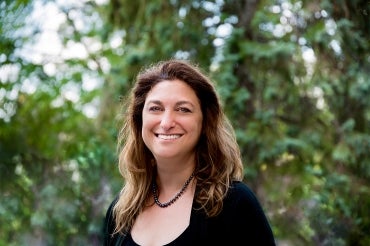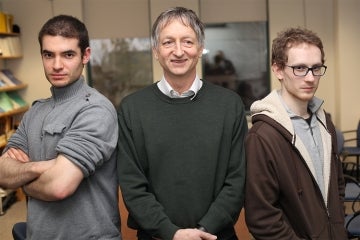Defy Dementia podcast inspires people of all ages to improve brain health … including its expert co-host

Allison Sekuler, a cognitive neuroscientist, is among the researchers at the Baycrest Centre who are working to advance the field of “precision aging” by applying the principles of precision medicine to aging and brain health (photo by Donna Waxman)
Published: April 17, 2024
Cognitive neuroscientist Allison Sekuler says she and science communicator Jay Ingram launched the Defy Dementia podcast to empower people to make simple changes to improve their brain health.
What she didn’t expect was that the project would inspire her to make changes of her own.
As the Baycrest Centre’s Sandra A. Rotman Chair in cognitive neuroscience at the Rotman Research Institute and president and chief scientist of Baycrest Academy for Research and Education and Centre for Aging + Brain Health Innovation, Sekuler is well-versed in the growing body of science linking dementia risk to lifestyle factors such as social isolation, sleep and exercise.
But when Defy Dementia launched a year ago, Sekuler admits that she had fallen into a rut on the fitness front. Despite continuing to pay monthly membership fees, she hadn’t set foot in a gym since the COVID-19 lockdowns in early 2020.
That soon changed as she and Ingram heard from listeners who were putting the podcast’s advice into practice.
“It’s been gratifying, intellectually, that we're able to make a difference in people's lives,” says Sekuler, who is a professor of psychology in the University of Toronto’s Faculty of Arts & Science. “But it's also had a deep personal impact on me, inspiring me to get myself up off the couch and start becoming more active.”
In particular, she credits two podcast conversations with getting her back into the gym: a pep talk from octogenarian bodybuilder Ernestine Shepherd, and the story of listener-turned-guest Ravi Venkatesh, an IT specialist in Mississauga, Ont., who told the hosts how the podcast had motivated him to recommit to his yoga regimen.
As Sekuler sees it, she’s just one beneficiary of the community of learning that has sprung up around Defy Dementia, which is currently vying for a voter-chosen Webby Award for podcasts in the health, wellness and lifestyle category (voting is open until April 18).
A general term encompassing several diseases that impair memory, thinking and reasoning, dementia is projected to afflict 150 million people by 2050, including more than one million in Canada, according to research published in The Lancet.
“Obviously, nobody wants to get dementia, and there are things you can do to decrease your risk. But even people who are living with the disease, it's not necessarily, you know, a death sentence,” says Sekuler, whose research specializes in the links between perception, memory and aging.
“Our goal was … to portray a realistic view of the disease and of aging, but [also] to show the possibilities that are there.”
Sekuler is among the scientists at the Baycrest Centre working to advance the field of “precision aging,” applying the principles of precision medicine to aging and brain health to detect, treat and care for people with dementia in a personalized way.
Research suggests we have more control over dementia than one might think – a 2020 report by the Lancet Commission found a dozen modifiable risk factors account for 40 per cent of dementias, including hearing impairment, smoking and obesity – but Sekuler stresses that many of the interventions under development are only effective if the disease is caught early.
Hence, a key challenge facing the field is the popular belief that dementia is a disease determined solely by your genes.
On Defy Dementia, Sekuler and Ingram, who have been collaborating since the 1990s, push back against this misconception by offering tips on reducing risk through lifestyle changes. That includes episodes focused on subjects such as cognitive engagement, nutrition, sleep and stress.
Sekuler attributes much of the podcast’s resonance to its format. Each episode features one guest sharing their personal experience with dementia, followed by a scientist who responds to the story with expert context and insights.
“It made the science that much more accessible and relatable,” she says.
Sekuler says she was surprised to find that people of all ages are tuning in – not just the older crowd that she and Ingram initially expected to attract.
“You’re never too young or too old to take care of your brain,” Sekuler says. “The sooner you start taking actions to improve your lifestyle, the more it becomes a habit for you throughout your life.”



